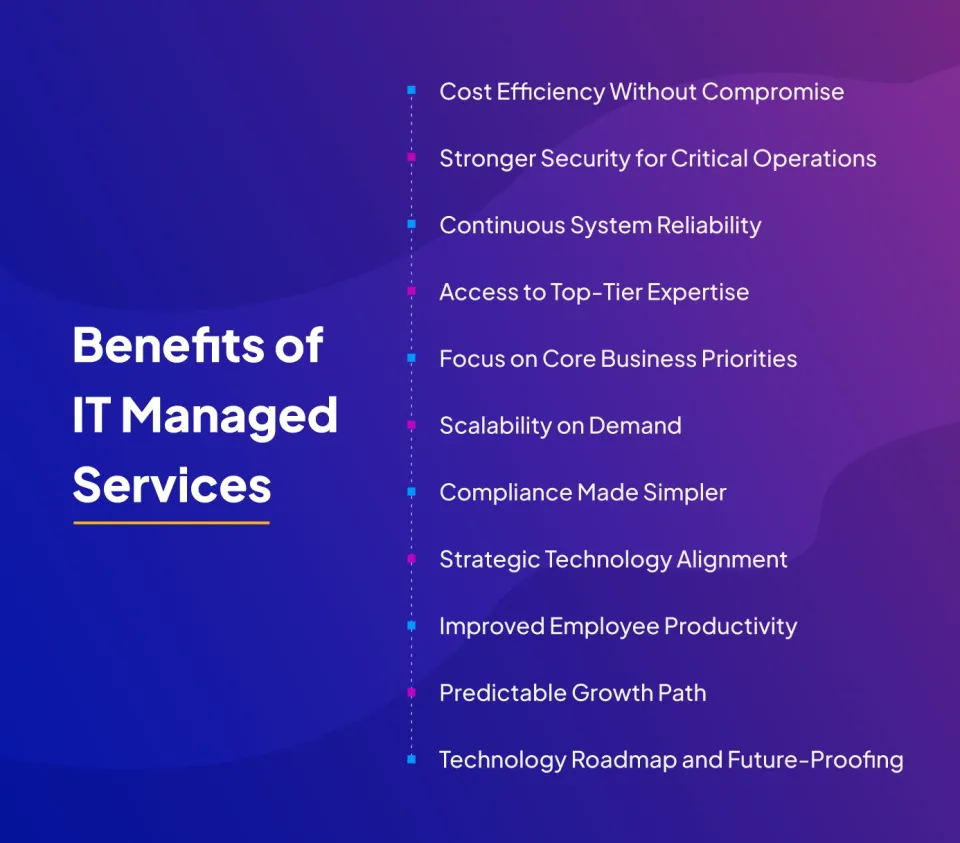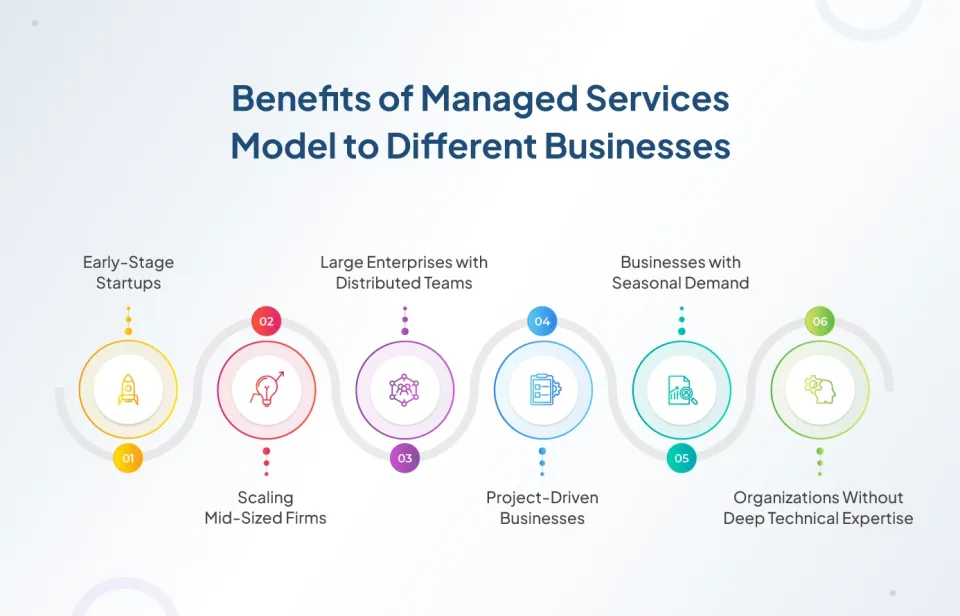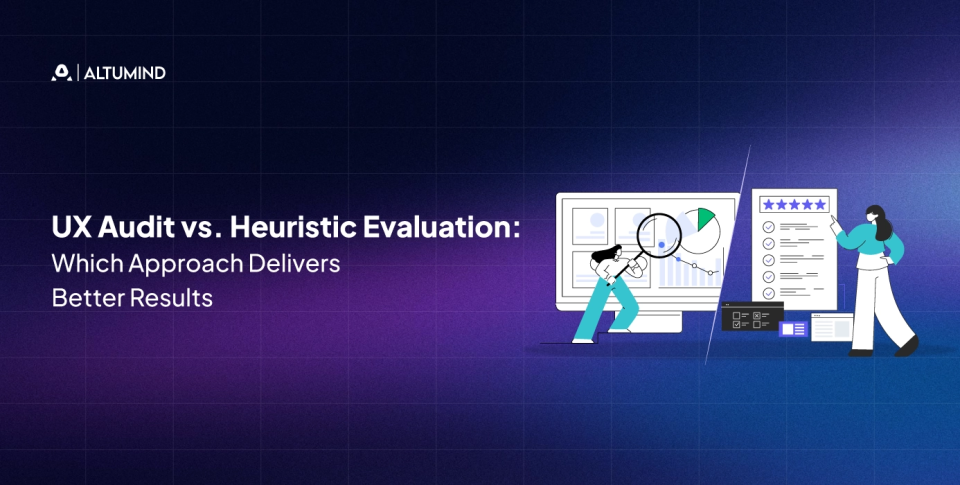11 Crucial Benefits of IT Managed Services for Every Business in 2025

Benefits of it managed services have become the central discussion in the technology sector. They are no longer limited to solving occasional system issues. Instead, they represent a fundamental shift in how enterprises build stability and progress in a digital-first economy.
These services act as the backbone of modern IT, holding together operations that keep businesses competitive. Companies that fail to adopt them risk falling behind, facing escalating costs, weaker security, and an inability to keep pace with rapid technological change.
So, if you’re eager to see how this model can reshape your business performance and long-term resilience, keep reading. In this blog, we explore the crucial benefits of IT managed services for businesses.
The Growing Need for Managed IT Services
Before outlining the benefits of the managed services model, it is important to understand why it has become indispensable. Modern enterprises run on technology for everything from daily processes to customer engagement, yet handling IT fully in-house is increasingly unsustainable. Rising costs, widening security gaps, and limited internal expertise leave organizations exposed. Even one serious incident can disrupt operations, and the pace of emerging threats is faster than most in-house teams can match.
The scale of the problem is alarming. The Identity Theft Resource Center (ITRC) claims that in a single year, over 3,200 data compromise incidents were reported in the United States, affecting hundreds of millions of individuals and resulting in losses climbing into the multi-million-dollar range per breach. Globally, the average cost of a data breach has surged close to 5 million dollars, reflecting an almost 10% rise in just one year.
Smaller companies are at even greater risk. Research shows they are 3 times more likely to be targeted than larger enterprises, with 70% of attacks directed at them. For leadership teams, IT is no longer a background function but a constant source of operational risk that demands resources, vigilance, and specialized expertise. This is where the managed services model proves vital. Partnering with dedicated providers gives decision-makers confidence to focus on innovation and growth rather than the next potential disruption.
Benefits of IT Managed Services

1. Cost Efficiency Without Compromise
Rising IT expenses strain budgets, especially when unexpected breakdowns or sudden upgrades appear. In-house teams often stretch thin, leaving companies to choose between hiring more staff or delaying crucial updates. Both paths drive costs upward without improving outcomes.
Take the healthcare industry as an example. Hospitals and clinics must manage advanced systems for patient records, imaging, and billing. With the rapid digitization of healthcare using AI, these systems have become even more complex to maintain. Building large in-house IT teams is prohibitively expensive, yet downtime is not an option.
Managed IT services provide predictable costs while maintaining system reliability. Instead of reacting to budget spikes, healthcare providers gain financial stability and uninterrupted continuity of care.
2. Stronger Security for Critical Operations
Cyberattacks are becoming more sophisticated and frequent, while internal IT teams struggle to keep pace. One breach can disrupt services, damage reputation, and trigger heavy penalties for non-compliance. Many organizations lack the resources to stay ahead of constantly evolving threats.
Consider the financial services sector. Banks and fintech companies face relentless attacks on customer data and payment systems. A single vulnerability can cost millions and erode customer confidence.
With managed IT services, these institutions gain advanced threat monitoring, regular security audits, and compliance alignment. This allows them to safeguard sensitive data and maintain uninterrupted service without overloading internal teams.
3. Continuous System Reliability
Unexpected downtime halts productivity and leads to significant revenue losses. Internal teams often focus on fixing issues after they occur, rather than preventing them in the first place. This reactive approach leaves operations exposed to disruptions.
Manufacturing firms illustrate this risk well. A sudden outage in production line systems can delay shipments, frustrate clients, and cause cascading losses.
Managed IT services offer 24/7 monitoring and proactive maintenance that keep systems stable. By identifying and resolving issues early, these services prevent costly stoppages and keep operations moving without interruption.
4. Access to Top-Tier Expertise
Technology evolves rapidly, and many organizations struggle to maintain in-house teams with the right mix of skills. Hiring specialized professionals is costly and often unrealistic for smaller teams, which leads to delays in adopting new solutions or fixing complex problems.
Retail is a strong example here. As shopping shifts online, retailers must integrate payment systems, customer analytics, and supply chain tools. Most do not have specialists for each system in-house, which makes it difficult to overcome challenges of eCommerce effectively.
Managed IT services provide direct access to experienced professionals who bring niche expertise. Retailers can adopt new technologies faster and keep their digital storefronts efficient without stretching budgets on constant recruitment.
5. Focus on Core Business Priorities
When executives and staff spend time solving recurring IT issues, strategic goals suffer. Valuable resources shift away from innovation, customer experience, and revenue growth. Over time, this slows competitiveness in the market.
Consider the hospitality industry. Hotels and resorts rely on booking engines, guest apps, and property management systems. If leaders spend energy fixing outages instead of enhancing guest experiences, customer satisfaction drops.
With managed IT services, operational stability is handled externally. This allows leadership teams to concentrate fully on improving services, building brand loyalty, and growing revenue streams.
6. Scalability on Demand
Growth brings increasing IT demands, from new user accounts to expanded infrastructure. In-house systems often cannot scale fast enough, leading to delays and inefficiencies. Downsizing poses another challenge, as maintaining unused resources drains capital.
The education sector highlights this struggle. Universities experience fluctuating demand during admissions or online exam periods, causing sudden spikes in usage. Without scalable systems, downtime and frustration follow.
Managed IT services deliver flexibility, adjusting resources as needed without excess cost. Institutions can handle high demand seamlessly and scale back afterward, keeping systems aligned with real requirements.
7. Compliance Made Simpler
Regulatory requirements are becoming more stringent, and falling short can result in fines, reputational harm, and operational disruption. Many organizations lack in-house expertise to keep up with constantly changing rules, especially across multiple regions.
Healthcare illustrates this challenge clearly. Hospitals and clinics must comply with strict regulations such as HIPAA in the U.S. A small oversight in data handling can lead to severe penalties and patient trust issues.
Managed IT services bring specialized compliance knowledge, regular audits, and reporting that help organizations stay aligned with regulations. Instead of reacting to compliance failures, healthcare providers operate with confidence and avoid unnecessary risk.
8. Strategic Technology Alignment
Many organizations implement tools in isolation, leading to fragmented systems that hinder long-term progress. Without proper planning, IT becomes a patchwork of short-term fixes rather than a driver of sustainable growth.
Take the logistics industry as an example. Companies often run disconnected systems for inventory, fleet tracking, and customer management. This slows operations and creates inefficiencies.
Managed IT services align technology with business objectives, designing roadmaps that integrate systems and prepare organizations for the future. Logistics firms gain not only efficiency but also the ability to expand into new markets with stronger digital foundations.
9. Improved Employee Productivity
When IT systems break down, employees lose valuable time waiting for fixes. Frequent disruptions hurt efficiency, frustrate staff, and reduce both morale and overall performance.
The legal sector shows how critical this is. Law firms rely heavily on case management platforms, secure document storage, and communication systems. Any outage means billable hours are lost and deadlines are missed.
Managed IT services keep systems reliable and provide quick responses when issues arise. Lawyers and support staff spend less time troubleshooting and more time serving clients effectively.
10. Predictable Growth Path
Uncertainty in IT costs and performance often slows expansion plans. Leaders hesitate to scale when technology feels unstable or unpredictable. Without a solid IT foundation, growth becomes a risky move.
The real estate sector provides a clear picture. Agencies expanding into new regions need reliable communication systems, secure document handling, and online platforms for clients. If IT struggles to keep pace, deals stall and opportunities slip away.
Managed IT services provide consistent infrastructure that supports scaling with confidence. Growth becomes structured and sustainable instead of uncertain.
11. Technology Roadmap and Future-Proofing
Rapid innovation means systems can become outdated quickly. Businesses that fail to adapt risk being left behind, losing competitiveness to rivals who adopt advanced tools faster. Many internal teams lack the capacity to track every emerging technology, let alone integrate it effectively.
In the manufacturing industry, AI-driven predictive maintenance is transforming efficiency. Plants that still rely on manual checks face higher downtime and unexpected failures.
Managed IT services provide a clear technology roadmap, keeping systems current with the latest upgrades and innovations. Providers also integrate advancements like AI and automation to strengthen performance and resilience. This forward-looking approach prepares enterprises for today and the future too.
benefits of it managed services Model to Different Businesses

The value of managed IT services depends heavily on how a business is structured and the pace at which it scales. Some business types gain more because of the unique challenges tied to their size and operational complexity.
1. Early-Stage Startups
Young companies often run lean with small teams and limited budgets. Building a full IT department is rarely possible, yet reliable systems are still critical. Managed IT services give startups professional-grade infrastructure and support without draining resources needed for growth.
2. Scaling Mid-Sized Firms
As a business grows from a few dozen employees to several hundred, IT demands rise sharply. Systems that once worked smoothly struggle under larger data volumes, more users, and security requirements. Managed IT services allow mid-sized firms to scale with stability while keeping costs predictable.
3. Large Enterprises with Distributed Teams
Enterprises that operate across multiple branches or international offices often face fragmented IT systems. Managing each location separately creates inefficiencies and increases risks. Managed IT services centralize monitoring, security, and support, keeping operations consistent across every site.
4. Project-Driven Businesses
Companies that work on client-based projects experience fluctuating IT needs. Some projects require advanced tools, while others need only basic systems. Managed IT services provide flexibility, allowing resources to expand or contract based on project requirements.
5. Businesses with Seasonal Demand
Retailers during holidays, schools during admissions, and travel companies during peak periods often face sudden spikes in system usage. In-house teams cannot always scale quickly enough to handle the surge. Managed IT services provide the capacity to manage peak demand and then scale down afterward.
6. Organizations Without Deep Technical Expertise
Many businesses excel in their core areas but lack advanced IT expertise internally. Managing cybersecurity, compliance, and new technologies becomes overwhelming. Managed IT services fill this gap with specialized support, allowing leaders to focus on strategy and performance.
Tips for Selecting the Right Managed Services Provider (MSP)
To gain the full benefits of managed IT services, you need a provider that functions as a true partner. The right MSP strengthens operations, improves efficiency, and protects your business from growing IT risks. Here are essential tips for making the right choice:
1. Proven Track Record and Experience
Choose a provider with years of industry experience and evidence of delivering consistent results. A strong background shows they can handle complex systems and adapt to changing business needs without disruptions.
2. Security Capabilities and Compliance Knowledge
Your provider should place security at the core of their services. Look for continuous monitoring, proactive defenses, and compliance expertise that reduces risk and supports regulatory requirements across industries.
3. AI-Assisted Services for Efficiency
Modern MSPs are adopting AI for monitoring, security, and automation. Research shows companies using AI in security save an average of 2.22 million dollars annually compared to those that don’t. This makes AI-driven services a powerful differentiator.
4. Scalability of Services
The right MSP grows with your business instead of holding it back. They should offer flexible resources that scale up during expansion or high demand and scale down during slower periods without adding unnecessary cost.
5. Strong Client Reviews and Trust Badges
Reputation matters when selecting an MSP. Look for verified reviews on platforms like Clutch and Trustpilot, as well as industry trust badges. These validate credibility and show how well the provider performs for existing clients.
6. 24/7 Availability and Support
Technology issues can appear anytime, and waiting until morning is not an option. A reliable MSP offers continuous support, with teams available at all hours to address incidents quickly and minimize downtime.
7. Alignment with Business Goals
Your provider should not just maintain systems but also align IT services with your company’s future. An MSP that understands your strategic objectives helps shape a technology roadmap that supports growth and innovation.
Wrapping Up
The growing complexities of IT demand more than in-house fixes. From cost stability and security to compliance, scalability, and innovation, the benefits of managed IT services have become a foundation for resilience and growth. Organizations across every sector gain not only stability but also the ability to compete with confidence.
By partnering with managed IT service providers, decision-makers gain a trusted ally that supports long-term strategy. IT shifts from being a drain on resources to becoming a driver of progress. For leaders focused on growth, innovation, and customer trust, managed IT services are no longer optional. They are the key to building stronger, smarter, and future-ready enterprises.
So, what is holding your business back from experiencing the real benefits of managed IT services today? At Altumind, our fully managed IT services are designed to simplify operations, strengthen security, and accelerate growth. Contact us to learn how we can help your business operate with greater confidence, efficiency, and long-term success.
Let's Connect
Reach out and explore how we can co-create your digital future!







